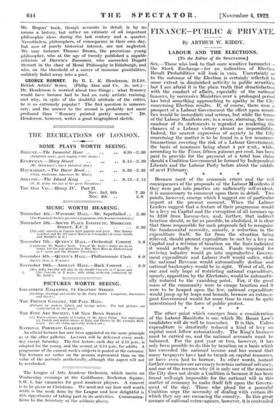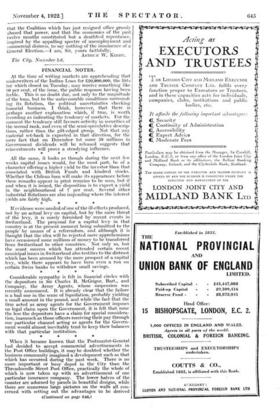FINANCE-PUBLIC & PRIVATE.
By ARTHUR W. KIDDY.
LABOUR AND THE ELECTIONS.
[To the Editor of the SPECTATOR.] SIR,—Those who look to that once sensitive barometer— the Stock Exchange—for an indication of Election Result Probabilities will look in vain. Uncertainty as to the outcome of the Election is certainly reflected to • some extent in diminished activity in public securities, but I am afraid it is the plain truth that dissatisfaction with the conduct of affairs, especially of the national finances, by successive Ministries over a prolonged period has bred something approaching to apathy in the City concerning Election results. If, of course, there were a prospect of a Labour Government the effect upon securi- ties would be immediate and serious, but while the terms of thd Labour Manifesto are, in a sense, alarming, the very candour of its statements is regarded as rendering the chances of a .Labour victory almost an impossibility. Indeed, the nearest expression of anxiety in the City concerning the matter is to be found in a few insurance transactions covering the risk of a Labour Government, the basis of insurance being about 4 per cent., while, according to the Times, fifteen guineas per cent. has been paid to provide for the payment of a total loss claim should a Coalition Government be formed by Independent Liberals and the Labour Party before about the middle of next February. - * Because most of the economic errors and the evil consequences of the proposals of the Labour Manifesto if they were put into practice are sufficiently self-evident, it is unnecessary to comment upon them in detail. Two points, however, emerge which I suggest are of particular import at the present moment. When the Labour Leaders suggest that a feature of their programme would be a levy on Capital and the exemption of all incomes up to £250 from Income-tax, and, further, that indirect taxation should, so far as possible, be abolished, it is clear that those responsible for such proposals fail to recognize the fundamental necessity, namely, a reduction in the expenditure itself. So far from the situation being relieved, should present expenditure be met by a levy on Capital and a revision of taxation on the lines indicated it would actually be worsened. Funds required for reviving industry would go into unproductive Govern- ment expenditure and Labour itself would suffer, while the national Revenue would automatically decline and national bankruptcy would be in sight. Worst of all, the one and only hope of restricting national expenditure, namely, opposition by the Electorate, would be automatic- ally reduced to the vanishing point. For, if the great mass of the community were to escape taxation and it were to be heaped upon the few, national expenditure would jump up by leaps and bounds, because an extrava- gant Government would for some time to come be quite unrestrained by the force of public protest.
* * * * The other point which emerges from a consideration of the Labour Manifesto is one which Mr. Bonar Law's candidates will do well to remember. It is this. Unless expenditure is drastically reduced a kind of levy on capital must follow automatically. The King's business must be carried on, and the national accounts must be balanced. For the past year or two, however, it has only been possible to do this by taxation on a basis which has exceeded the national income and has meant that many taxpayers have had to trench on capital resources, or have even had to borrow. In other words, instant further economies are necessary to retain national solvency, and one of the reasons why (it is only one of the reasons) the City does not desire a Coalition is because it has been found well-nigh impossible for the national will in this matter of economy to make itself felt upon the Govern- ment of the day. Those who plead for a powerful Coalition urge the necessity of dealing with certain ills which they say are menacing the country. In this great. menace of' national extravagance, however, it is contended that the Coalition which has just resigned office grossly abused that power, and that the economies of the past twelve months constituted but a deathbed repentance, inspired by the appalling spectre of unemployment and commercial distress, to say nothing of the imminence of a General Election.—I am, Sir, yours faithfully,
ARTHUR W. KIDDY.
The City, November 1st.







































 Previous page
Previous page